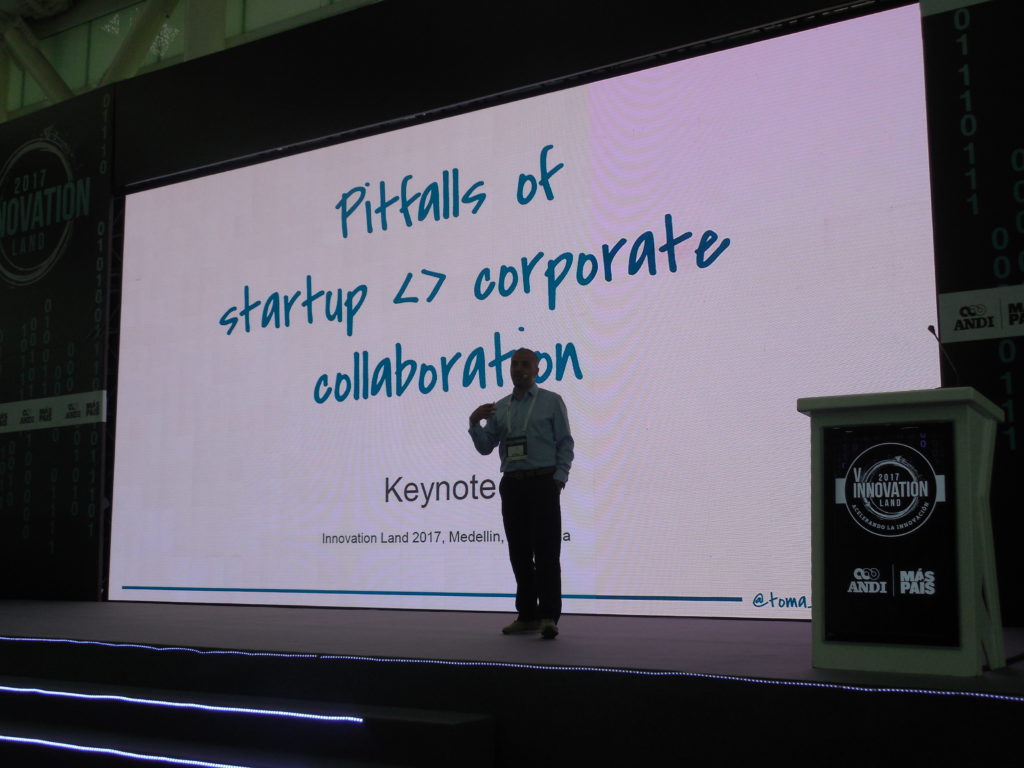Speaking at Innovation Land 2017 in Medellin, Colombia on Wednesday, Dan Toma, co-author of “The Corporate Startup” gave 13 reasons why startup and corporate collaborations fail.
Originally appearing as a two-part series on The Sociable, I have combined those two articles into one, so that all the takeaways for startups are in one place.
According to Toma, there are at least 13 ways startup and corporate collaborations can fail, including seven ways before they even start, and six more after they’ve begun.
Why startup and corporate collaborations fail before they even start

Dan Toma delivers his keynote address at Innovation Land 2017 in Medellin, Colombia
1) HAVING ONLY ONE CONTACT PERSON (OR DEPARTMENT) FROM CORPORATE THAT WORKS WITH STARTUPS
The Problem: What happens when the contact person changes position for whatever reason? This person could be promoted, transferred, fired, ill, or out on maternity or paternity leave. If this happens, the entire portfolio of startups the person worked with is going to die, and all the money spent developing relationships is gone.
The Solution: Always asks for at least two points of contact at the negotiating table.
2) STARTUPS AREN’T ALWAYS CLEAR ABOUT WHERE THEY ARE WITH THEIR TECHNOLOGY
The Problem: Since startups are always pushing for innovation, sometimes their assumptions about how far along their technology is is lost in their ambitions for growth. This could mean not knowing whether they have just a concept, a prototype, or they simply forget where they are in development.
The Solution: Come up with some sort of “Technology Readiness Level (TRL)” to assess where you are with your technology. Toma gave an example of what NASA developed in the 1960s which is still being used today by the Department of Defense. Instead of going into the full details here, you may check out NASA’s TRL here.
3) STARTUPS HAVE AN UNCLEAR KNOWLEDGE-TO-ASSUMPTION RATIO
The Problem: Startups are famous for their risk-taking behavior, but sometimes that behavior can go awry when they don’t know how much they know vs how much they assume.
The Solution: According to Toma and “The Corporate Startup” co-author Tendayi Vikion Medium:
“The ultimate goal of a business venture that is searching for sustainable business model is reducing the amount of non-validated vs. validated assumptions in their business model. The closer to 1 this ratio is, the better. This because a ratio of 1 means that all assumptions within the business have been validated.
Indeed, for startups, a knowledge-to-assumption ratio equaling 1 will result in a very favorable investment valuation. In other words, an entrepreneur keeps more of his company if the investment risk is minimal (knowledge-to-assumption ratio close to 1), whereas investors demand more equity from risky ventures. As such, from a governance perspective, the knowledge-to-assumption ratio informs management about how close a business venture is to product-market fit and whether further investment is justified.”
4) NOT HAVING A CLEAR MANDATE OR INNOVATION THESIS FROM CORPORATE
The Problem: In his presentation Toma likened the corporate and startup relationship to parents going to a candy store with their children; the plan is to buy candy, but once the doors to the shop open, they are overwhelmed by the variety and selection. This is like a representative from Boeing getting excited about a cryptocurrency startup. Sure, the startup could be sweet and tempting, but is it really a good fit?
The Solution: Come up with a clear innovation thesis, so that everyone is on the same page. An innovation thesis sets boundaries, rules for specialization, and keeps the main goal in mind. An example would be former US President Kennedy’s moon mission speech. The goal was to get to the moon; not about how to build a rocket.
5) HAVING AN UNCLEAR COLLABORATION FOCUS
The Problem: A corporation doesn’t always understand which startups or portfolio would help its core business.
The Solution: Corporate needs to understand what the startups actually do and what their limitations are. If they start negotiating with the wrong startups, corporations lose time and energy while startups get screwed because they lose their funding.
6) LACKING A CLEAR COLLABORATION TYPE
The Problem: When a collaboration type is not defined, many problems can result. For instance, do you know if the collaboration is a payed trial, demonstration, free trial, a purchase order, an acquisition, or an investment?
The Solution: Both startups and corporations need to agree and align expectations on collaboration. What exactly will each party work on?
7) HAVING AN UNCLEAR TECHNOLOGY INTEGRATION CRITERIA
The Problem: Corporations don’t understand how a startup’s technology works, nor how its infrastructure is designed, so compatibility becomes an issue.
The Solution: Corporate needs to know how startups’ infrastructure works so that it can be adapted and scalable with corporate needs. Many times this isn’t brought up until collaboration contract is signed, and this spells disaster from a company.
Why startup and corporate collaborations fail after they’ve begun

Innovation Land 2017, Medellin, Colombia
8) HAVING UNCLEAR COMMUNICATION CHANNELS
The Problem: Most problems start with a lack of communication. The corporate person who signs the contract isn’t necessarily the person a startup will work with.
The Solution: In many cases there are language and cultural barriers that can make collaboration difficult to nearly impossible, so make sure you know who you will be dealing with and keep the line of communication open and fluid.
9) LACKING STANDARD OPERATING PROCEDURES FOR PROBLEM-SOLVING
The Problem: When something goes wrong, who will take care of it?
The Solution: There will always be bugs, glitches, or miscommunication across large teams, but having a capable go-to person or team that can put out fires once they start can ensure that the next time the system crashes, all the data is recoverable.
10) NOT KNOWING ABOUT LEGAL CONSTRAINTS
The Problem: Although it may seem like a small issue, this is one that can completely destroy a collaboration because when it comes to sensitive business and user data, things like server location can make or break a partnership.
The Solution: When it comes to legal constraints concerning data privacy, you should ask one simple question, “Where are your servers?” Some countries do not allow foreign client data to be stored on their servers, so this simple question can prevent a lot of headaches.
11) HAVING AN UNCLEAR DECISION MAKING PROCESS
The Problem: Oftentimes, big corporations are compartmentalized or organized hierarchically. When this happens, someone at the bottom may have a great idea, but the organization’s structure makes it difficult to reach the person in charge of decision making.
The Solution: Those at the top need to mandate decisions and implement them quickly instead of having employees going through multiple channels to turn ideas into reality. This means more openness and accessibility.
12) BEING UNCLEAR ABOUT PROCUREMENT AND PAYMENTS
The Problem: Who gets paid and when? For corporations, this may not be high on the list of importance, but for bootstrapped startups, they can go broke before they receive their first pay.
The Solution: Determine payment schedules and be sure that the startup can stay afloat during that time. Startups sometimes go four months without a paycheck, and they may have to shut down their companies because they run out of money before they even get paid.
13) HAVING UNCLEAR ACCESS TO THE CUSTOMER BASE, BRAND, AND CHANNELS
The Problem: Startups like partnering with big names because of the power of that brand. The Apple logo, for instance, can be worth more than the GDP of some countries, but if a startup doesn’t have access to that logo, brand, or customer base, it loses out on money and resources.
The Solution: As a startup, know what you have got yourself into. Corporate collaborations can bring you many things, but if you don’t have access to their brand or customers, you could be losing out big.
About Innovation Land 2017

Innovation Land 2017 in Medellin, Colombia was organized by ANDI, and took place from November 15 – 17. If you ever visit the “City of Eternal Spring” and attend an event hosted by ANDI, Jonathan is by far the man to go to for making connections and getting things done!










